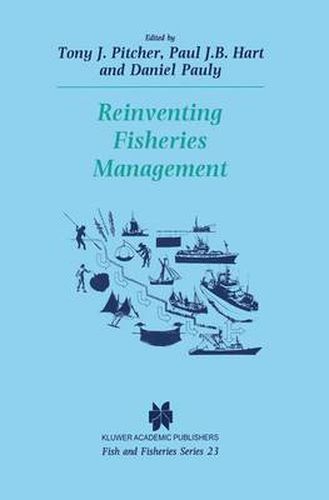Readings Newsletter
Become a Readings Member to make your shopping experience even easier.
Sign in or sign up for free!
You’re not far away from qualifying for FREE standard shipping within Australia
You’ve qualified for FREE standard shipping within Australia
The cart is loading…






This title is printed to order. This book may have been self-published. If so, we cannot guarantee the quality of the content. In the main most books will have gone through the editing process however some may not. We therefore suggest that you be aware of this before ordering this book. If in doubt check either the author or publisher’s details as we are unable to accept any returns unless they are faulty. Please contact us if you have any questions.
If judged by a dismaying track record, and a consequent downturn in the reputation of fisheries scientists, fisheries management is certainly a candidate for calls for reinvention. Fish communities are shifting towards small rapid-growing species. These symptoms have been accopmanied by a series of fisheries collapses that have not only been largely unforeseen by our most advanced assessment methods, but have also brought about disastrous economic consequences. Such things have even occurred in Canada, a nation with probably more top-rate fishery scientists per capita than any other. So fisheries science is now in a state of flux, and many feel it is at a cross-roads where new paradigms compete for attention and demand evidence of their utility. This book is organized into five section: why does fisheries managment need reinventing?; new policies for a reinvented fisheries management; the role of the social sciences in a reinvented fisheries mangagement; coping with ecology in a reinvented fisheries management; and modelling through in a reinvented fisheries management.
$9.00 standard shipping within Australia
FREE standard shipping within Australia for orders over $100.00
Express & International shipping calculated at checkout
Stock availability can be subject to change without notice. We recommend calling the shop or contacting our online team to check availability of low stock items. Please see our Shopping Online page for more details.
This title is printed to order. This book may have been self-published. If so, we cannot guarantee the quality of the content. In the main most books will have gone through the editing process however some may not. We therefore suggest that you be aware of this before ordering this book. If in doubt check either the author or publisher’s details as we are unable to accept any returns unless they are faulty. Please contact us if you have any questions.
If judged by a dismaying track record, and a consequent downturn in the reputation of fisheries scientists, fisheries management is certainly a candidate for calls for reinvention. Fish communities are shifting towards small rapid-growing species. These symptoms have been accopmanied by a series of fisheries collapses that have not only been largely unforeseen by our most advanced assessment methods, but have also brought about disastrous economic consequences. Such things have even occurred in Canada, a nation with probably more top-rate fishery scientists per capita than any other. So fisheries science is now in a state of flux, and many feel it is at a cross-roads where new paradigms compete for attention and demand evidence of their utility. This book is organized into five section: why does fisheries managment need reinventing?; new policies for a reinvented fisheries management; the role of the social sciences in a reinvented fisheries mangagement; coping with ecology in a reinvented fisheries management; and modelling through in a reinvented fisheries management.